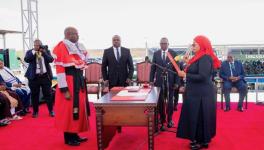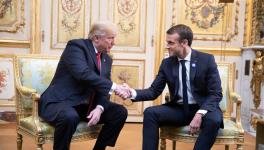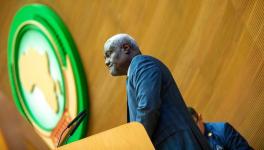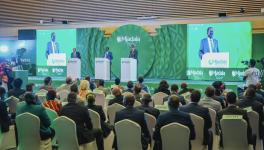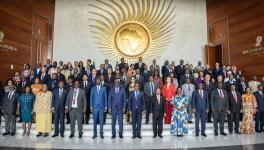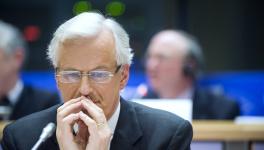Protesters in Chad Remain Skeptical of New Political Structure, French Approach
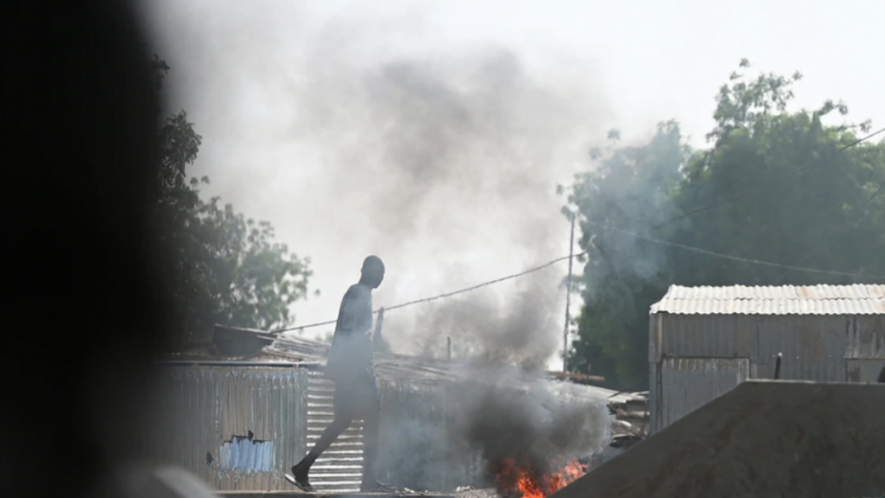
Protests in Chad in April 27. Photo: AFP
Pro-democracy protesters in Chad remain skeptical of French President Emmanuel Macron’s recent call for a civilian-led transition, only days after he backed a military coup. The coup placed General Mahamat Deby as the head of the new military junta in Chad following the death of his father, Idriss Deby, who had been president since coming to power in 1990 in a French-backed coup.
Macron called for a “civilian national unity government” after security forces killed several protesters while cracking down on the demonstrations against the military coup by civil society and opposition leaders on Tuesday, April 27.
While authorities admitted to five deaths, the Chadian Convention for the Defence of Human Rights (CTDDH) counted nine deaths. 36 others were wounded and 12 were arrested. “We denounce and condemn this massacre… (and) the disproportionate use of weapons of war against protesters,” the rights organization said in a statement.
Most of the protest actions were held in the capital city, N’Djamena, where plumes of black smoke rose from burning tyres throughout the day. Protests were also reported in Mondou, a city 400 kilometers to the south of N’Djamena, where police firing is said to have killed at least one person.
Anti-French slogans were common in these protests. French flags were also burnt as Chadians are incensed by the former colonizer’s attempt to prop up the regime by backing a military junta led by his son. Many Chadians, particularly youngsters, were hoping that the death of Idriss Deby could bring an end to the decades of authoritarian rule.
Known as the Transitional Military Council (TMC), the junta led by Mahamat Deby assumed power on April 20 after the army announced the death of Idriss Deby. The latter reportedly died due to the wounds sustained in the fighting between government troops and rebel forces during his visit to the frontline on April 18 and 19.
The same statement also added that Mahamat Deby and 14 other generals he had chosen will lead the country through a transitional period of 18 months, within which the presidential election will be conducted and power handed over. This body of generals replaced the government and the parliament which was dissolved.
The Chadian constitution, which provides that the speaker of the national parliament must take charge in the event of death of the president for a transitional period of 45 to 90 days, was suspended.
While the civil society and opposition leaders condemned this military takeover as an “institutional coup d’etat conducted by the generals” to facilitate a “monarchist devolution of power”, the French foreign ministry was quick to justify the move as a necessity for the maintenance of “stability”. The French president followed up on the act, reiterating his support to Mahamat Deby’s junta during the state funeral for Idriss Deby on April 23.
On April 27, after France received flak internationally for backing the military junta following the killing of pro-democracy protesters, Macron and Felix Tshisekedi, the president of Congo who currently holds the rotating presidency of the African Union (AU), held a meeting and issued a joint statement calling on the military junta to respect political rights of civilians.
Seeking to distance his government from the killings, Macron said, “I have given my support to the stability and integrity of Chad, very clearly in N’Djamena. I am for a peaceful, democratic, inclusive transition; I am not for a succession plan. And France will never stand with those who form this plan.”
Prior to the meeting, on Monday, April 26, Macron had called for “an inclusive transition process open to all Chadian political forces, led by a civilian national unity government that should lead to elections within an 18-month delay.” That day, the military junta appointed Albert Pahimi Padacke, a civilian politician, as the Prime Minister of this transitional government.
Critics, however, point out that neither Macron’s statement, which falls short of calling for the dissolution of the unconstitutional military junta, nor the latter’s arbitrary and unilateral appointment of Padacke, who is known to be a long-time loyalist of Idriss Deby, amounts to a shift away from military rule and towards a genuine civilian government.
Dinamou Daram, president of the Socialist Party Without Borders, told Reuters that Padacke “was prime minister under Deby and we will not accept for him to lead the transitional government. The junta wants to continue with the system of the old regime. We reject this way of proceeding.”
Yacine Abderamane, president of the opposition Reformist Party, maintains that “It is not up to the transitional military council to designate a prime minister in this isolated manner. We want there to be talks between political parties, civil society and other actors in order to reach a consensus.”
Analysts have pointed out that in other countries in the region, including Chad’s western neighbor Sudan, the military has been able effectively hold on to power, while sharing a portion of it with politicians, in an ostensibly ‘civilian-led transitional government’. Chadian protesters have expressed their unwillingness to give in to such a compromise.
Courtesy: Peoples Dispatch
Get the latest reports & analysis with people's perspective on Protests, movements & deep analytical videos, discussions of the current affairs in your Telegram app. Subscribe to NewsClick's Telegram channel & get Real-Time updates on stories, as they get published on our website.











